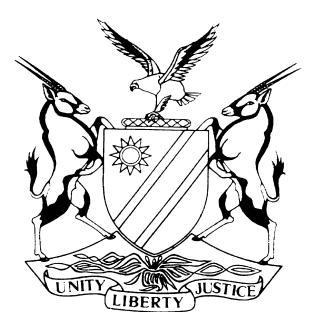

HIGH COURT OF NAMIBIA MAIN DIVISION, WINDHOEK
LEAVE TO APPEAL JUDGMENT
Case no: CA 26/2015
In the matter between:
THE STATE APPLICANT
v
DINALOMWENE HAIKALI RESPONDENT
Neutral citation: S v Haikali (CA 26/2015) [2018] NAHCMD 59 (20 March 2018)
Coram: USIKU J
Heard: 13 March 2018
Delivered: 20 March 2018
Flynote: Criminal Procedure – Application for leave to appeal in terms of Section 310 (1) of the Criminal Procedure Act (Act 51 of 1977) by State against decision of lower court ― Main test is whether there are reasonable prospects that applicant will succeed on appeal - Applicant successfully showing that they have reasonable prospect of success – Application for leave to appeal granted.
Summary: The State applied in terms of section 310(1) (b) for leave to appeal against the decision of the magistrate to discharge the accused, herein the respondent, in terms of section 174 of the Criminal Procedure Act. The respondent was jointly charged with another accused, for alleged theft of fish valued at N$ 30 678.79 that belonged to Pereira Seafood Company. The State proved that there is evidence upon which a reasonable man acting carefully could convict, and as such there was no justification for a discharge in terms of section 174 of the Criminal Procedure Act. The court held that there are reasonable prospects that the applicant would succeed on appeal and granted leave to appeal.
ORDER

The application succeeds and leave to appeal to the Supreme Court is granted to appeal against the acquittal in terms of section 174 of the Criminal Procedure Act.

LEAVE TO APPEAL JUDGMENT

USIKU J;
[1] The matter was submitted to this court for an application for leave to appeal in terms of section 310 (1) of the Criminal Procedure Act by the State, herein referred to as the applicant against the respondent.
[2] The respondent appeared before the Magistrate’s Court sitting at Walvis Bay where he was jointly charged with one, Ricardo Tjongarero, for alleged theft of fish valued at N$30 678.79 and was in the lawful possession of Pereira Seafood Company.
[3] The respondent was represented by a lawyer during his trial and pleaded not guilty to the charge. A trial ensued, whereafter at the end of the State’s case, the magistrate found the respondent not guilty and discharged him in terms of section 174 of the Criminal Procedure Act, after an application for discharge was made through his legal representative. It is against this decision that the State now wishes to appeal. An application for condonation of the late filing of the application for leave to appeal was filed by Mr Moyo, counsel for the applicant. The application for condonation was not opposed and as such, the late filing is hereby condoned.
[4] It must be noted that this Court had earlier referred this matter to the court a quo which decision was erroneously made, as the application was for leave to appeal to the Supreme Court. Thus an application is before this court.
[5] The applicant’s grounds are that the magistrate erred by finding that there was no evidence upon which a reasonable court, acting carefully, may convict; whereas there is/was evidence upon which a reasonable court, acting carefully, may convict.
[6] Section 174 of the Criminal Procedure Act states the following:
‘If, at the close of the case for the prosecution at any trial, the court is of the opinion that there is no evidence that the accused committed the offence referred to in charge or any offence of which he may be convicted on the charge, it may return a verdict of not guilty.’
[7] The state argued that the respondent and his co-accused were identified by the first state witness from the CCTV footage that was presented before court and this identification was neither denied nor disputed by both. The respondent further admitted that he was at his work place on the night of 27 September 2012 after his shift had ended, which of course effectively placed him on the scene. This in itself constitutes as evidence. The respondent initially opposed the application under his previous legal representative. He is currently represented by Mr Ipumbu, who submitted that he has no issue with the case going back to the magistrate’s court.
[8] However, in S v Simon1, it was held that in order for a court to arrive at a decision whether or not the state adduced evidence upon which a reasonable court, may convict, it must have regard to the cogency of the evidence adduced. Which, simply put, means that there must be a factual evidence to support one’s claims. A party is required to substantiate whatever he/she claims to be the truth, whether it turns out to be true or not. I believe that the fact that respondent was at the workplace long after his shift had ended is sufficient evidence which calls for him to be put at his defence.
[9] It is my considered view that a prima facie case was made out at the close of the State’s case. The magistrate discharged the respondent when she should have, in my view, placed him on his defence, based on the fact that the learned magistrate, with respect, misdirected herself. I therefore find that another court may come to a different conclusion and that there are reasonable prospects of success on appeal.
[10] In the result, the application succeeds and leave to appeal to the Supreme Court is granted to appeal against the acquittal in terms of section 174 of the Criminal Procedure Act.
----------------------------------
D N USIKU
Judge
APPEARANCES:
APPLICANT: Mr Moyo
Of the Office of the Prosecutor General, Windhoek
RESPONDENT: Mr Ipumbu
Titus Ipumbu Legal Practitioners, Windhoek
1 S v Simon (CA19/2015) [2017] NAHCNLD 18 (3 March 2017) at para 18.